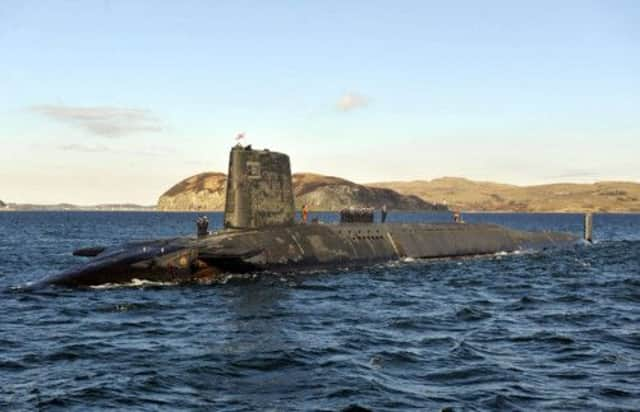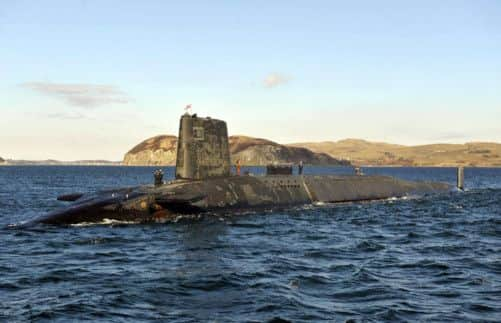Comment: ‘Balkanisation’ independence claim


However, one might think he would concentrate his fire on the difficulties of unpicking the complex matrix of international relationships of which the UK is currently a part – not least the future role of an independent Scotland in Nato, of which Lord Robertson was of course a former secretary general.
Lord Robertson touched on these issues at the Royal Society of Edinburgh’s debate on the potential implications of Scottish independence on defence and international relations on Wednesday evening. However, he chose to major on a very different topic – the impact of independence on European separatist movements.
Advertisement
Hide AdAdvertisement
Hide AdA Yes vote in September 2014 would encourage a range of independence groups across Europe to seek self-determination, Lord Robertson argued. He named five regions where separatists (his words) might follow Scotland’s lead – Catalonia in Spain, Flanders (Belgium), Corsica (France), Lombardy (Italy) and Transylvania (Romania).


Scottish independence could be the first domino to fall in the Balkanisation of Europe, he claimed. There were a number of sharp intakes of breath at the word “Balkanisation”, originally used to describe the break-up in the 19th and early 20th century of the old Ottoman and Austro-Hungarian empires in south-east Europe.
More recently, however, Balkanisation referred to the break-up of the former Yugoslavia following the brutal wars of the early 1990s, a process most closely associated in people’s minds with ethnic cleansing and atrocities on a scale that it was hard to comprehend in the late 20th century.
An academic in the audience denounced the reference to Balkanisation as “crass”, but in response, Lord Robertson continued down the same path. There was a danger that an independent Scotland might not be accepted into the international community by countries which had their own issues with separatism, Lord Robertson suggested, citing the example of Kosovo.
The reason Kosovo had struggled to gain international recognition was because countries such as Spain, Italy, Romania and Slovakia were concerned that accepting Kosovo as an independent state (not a region of Serbia) would mean further pressure for self-determination within their own borders.
Irrespective of whether Lord Robertson’s comments were crass, ill-considered or otherwise, were they actually relevant to the debate? I spoke later to a number of people at the RSE event who do not support independence and they considered his comments irrelevant to their thinking. What might happen, sometime in the future, in a number of different European countries, all subject to their own domestic economic, social and political conditions, was really of no importance to them in deciding how to vote in next year’s referendum.
Why Lord Robertson threw this red herring so heavily into a ten-minute speech is hard to fathom, especially when there are so many challenging questions for supporters of independence around defence and international relations.
Lord Robertson made some generic points, but they were also largely political, rather than being founded on his own deep experience. Unpicking the UK’s international relationships would be “an act of vandalism”, he argued, at a time when the world was a very uncertain and unstable place.
Advertisement
Hide AdAdvertisement
Hide AdHe made the general point that many countries who were friends of the UK were not happy with the prospect of the UK breaking up, but there was little elaboration. It was left to fellow panellist, Dr Phillips O’Brien, to articulate why this might be a problem; countries such as the United States, France, Germany and Spain were “not wild” about the prospect of Scottish independence because the UK “enmeshes” well into existing international structures, he suggested.
However, a third speaker said although most major powers were not supportive of Scottish independence, they did not fear it.
William Walker, professor of international relations at St Andrews University, said his discussions with diplomats from several countries indicated that they believed Scotland could run itself quite easily. They thought it would be “a small, but distinguished voice in the international community” and would accept Scotland into that international community as a stable and functioning state.
Prof Walker, backed by Dr O’Brien, said there were more challenging questions for both Scotland and the rest of the UK around the future of Trident. Irrespective of the independence debate, the policy on a Trident replacement was in flux and the likely outcome was some form of diminished UK deterrent, Prof Walker suggested. If Scotland voted Yes, the situation became even less certain and finding a consensus way forward would be almost impossible, he said.
Dr O’Brien urged the SNP to be more honest about the implications of its non-nuclear policy. If it wanted Trident out of Faslane, it would have to take a massive jobs hit – unless it wanted to have thousands of people sitting around doing nothing. He proposed an interesting solution, using the difference between the SNP’s independent Scotland defence budget of £2.5 billion per annum and the lower £1.75-£1.8 bn figure suggested by Stuart Crawford and Richard Marsh in a paper published last year. This surplus, Dr O’Brien suggested, could be used to create a transitional fund to help support those jobs lost at Faslane and Coulport if Trident moves away.
Lieutenant Colonel Crawford, a former career army officer with 20 years in the Royal Tank Regiment, was the fourth speaker at the RSE event, and pointed out, slightly mischievously, that a senior SNP politician had told him there was no clear timetable in place for the removal of nuclear weapons from the Clyde. However, the SNP must offer more clarity in this area – if Trident goes, it will have to take a major jobs hit and if Trident stays, it will have to take a major hit from a significant number of its supporters who cannot countenance nuclear weapons in Scottish waters in the event of independence.
There are also big questions around the Glasgow shipyards in the event of independence. Phillips O’Brien said, bluntly, that the remainder of the UK would not build ships on the Clyde if Scotland became independent – and that further jobs would be lost in the west because a coastal defence base would have to be located in the east to provide protection for oil and gas fields.
Further challenging questions were posed around the relationship between a new Scottish defence force and the realigned defence forces in the rest of the UK; according to event chairman, Lieutenant General Sir Alistair Irwin, there would be a period of “organisational pandemonium” if Scotland became independent, which could take a very substantial time to settle down.
Advertisement
Hide AdAdvertisement
Hide AdWhat of intelligence and security in an era of terrorism, cyber-crime, people trafficking and industrial espionage? Stuart Crawford said Scotland couldn’t hope to replicate the scope of GCHQ and warned that the sharing of intelligence between the remainder of the UK and an independent Scotland could not be guaranteed.
These are all big questions: the future of thousands of jobs; an independent Scotland’s status in the world; the relationship with the armed forces in the rest of the UK; security arrangements after independence .
So why did Lord Robertson not pose them and instead choose to focus on the prospect of the Balkanisation of Europe? It is a question only he can answer – but many in the room who came along for informed and intelligent debate around independence were clearly disappointed by his distinctly unstatesmanlike approach.
As we all seek to pick our way through the complexities of debate, we need statesmen with hard facts and tough questions, not red herrings and scare stories. • Defence Policy: Protecting Scotland and Preserving Jobs, hosted by The Scotsman Conferences, is on Friday 14 June at the Scottish National Gallery, Edinburgh.